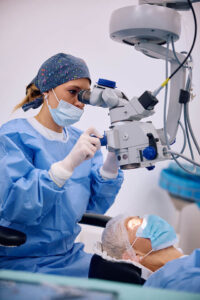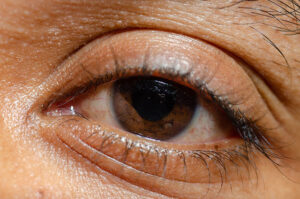Retinal tears are a serious ocular condition that can lead to vision loss if not promptly treated. The retina is a thin layer of tissue at the back of the eye that is essential for vision; it captures light and sends visual information to the brain. When a tear occurs, fluid from within the eye can pass through and lift the retina off the back of the eye, leading to a retinal detachment. To prevent this and preserve vision, retinal tear surgery is often necessary.
Retina & Vitreous of Louisiana, a pioneer among specialty ophthalmologists in the Baton Rouge area, has been at the forefront of treating vitreoretinal problems since 2000. Our highly-trained and dedicated eye doctors are committed to providing the best eye health treatment available in Louisiana. In this article, we will guide you through what to expect after undergoing retinal tear surgery, specifically laser surgery, which is one of the most effective treatment options available.
Overview of Laser Retinal Surgery

Laser surgery, also known as laser photocoagulation, is a common procedure used to treat retinal tears. The procedure involves directing a precise beam of laser energy to create small burns around the tear. These burns cause scar tissue to form, which effectively ‘welds’ the retina to the underlying tissue, preventing fluid from passing through the tear and reducing the risk of retinal detachment.
The purpose of laser surgery is to secure the retina in place promptly and effectively, with minimal invasion. It is often performed on an outpatient basis, meaning you can go home the same day, and it has a high success rate in preventing further retinal detachment.
[Related: What is Geographic Atrophy?]
Immediate Post Retinal Tear Surgery Expectations
After the procedure, it is common to experience some immediate postoperative symptoms. Patients may report seeing floaters or flashes of light, which typically diminish over a few days. The eye may feel irritated or sore, but severe pain is uncommon. It is crucial to arrange transportation home, as your vision may be blurry from the dilating drops or the effects of the laser.
Rest is important in the initial period after surgery. Your doctor will provide specific instructions, which may include wearing an eye patch or using medicated eye drops to prevent infection and reduce inflammation.
Retina Tear Surgery Short-Term Recovery Process
The recovery process in the days following laser surgery for a retinal tear is generally quick. Most patients can resume normal activities within a few days, but it is essential to avoid strenuous activities that could increase eye pressure and affect healing. Your doctor will advise you on when you can safely return to work and resume exercise.
During this time, it’s important to monitor for symptoms that could indicate further retinal inssues, such as:

- Increased floaters
- Persistent flashes of light
- A shadow appearing in your peripheral vision
If you experience any of these symptoms, contact Retina & Vitreous of Louisiana immediately at 225-768-8833.
Long-Term Healing and Care
Healing over the weeks and months following surgery involves the scar tissue fully securing the retina. Follow-up appointments are crucial to monitor the success of the surgery and the health of the retina. These appointments will allow your doctor to detect any changes early and take appropriate action.
Ongoing eye care, including regular check-ups and protecting your eyes from UV light with sunglasses, is essential for maintaining eye health and preventing future issues.
Lifestyle Adjustments After Retinal Tear Surgery
After retinal tear surgery, certain lifestyle adjustments are recommended to ensure proper healing. It is advisable to avoid activities that could lead to further eye trauma, such as contact sports or woodworking, until your doctor gives the all-clear. Be mindful of symptoms and protect your eyes from bright light and strain.
[Related: Can Dry Eyes Cause Retina Problems?]
Potential Complications and Their Management
While laser surgery is generally safe, potential complications can include infection, bleeding, or an increase in intraocular pressure. Be vigilant for signs of complications, such as pain, redness, or a decrease in vision, and seek medical attention if they occur.
Contact Retina & Vitreous of LA for Retina Surgery
The journey to recovery after retinal tear surgery involves understanding what to expect and diligently following your doctor’s advice. Immediate rest, monitoring symptoms, attending follow-up appointments, and making lifestyle adjustments are all part of the process.
At Retina & Vitreous of Louisiana, we are dedicated to supporting you every step of the way. Remember, preserving your vision is our mission, and we are here to provide exceptional care for your vitreoretinal needs. For any concerns or questions post-surgery, do not hesitate to contact us at 225-768-8833. Your eye health is our top priority, and we are committed to ensuring the best possible outcome for your vision. Contact us today to schedule an appointment.


